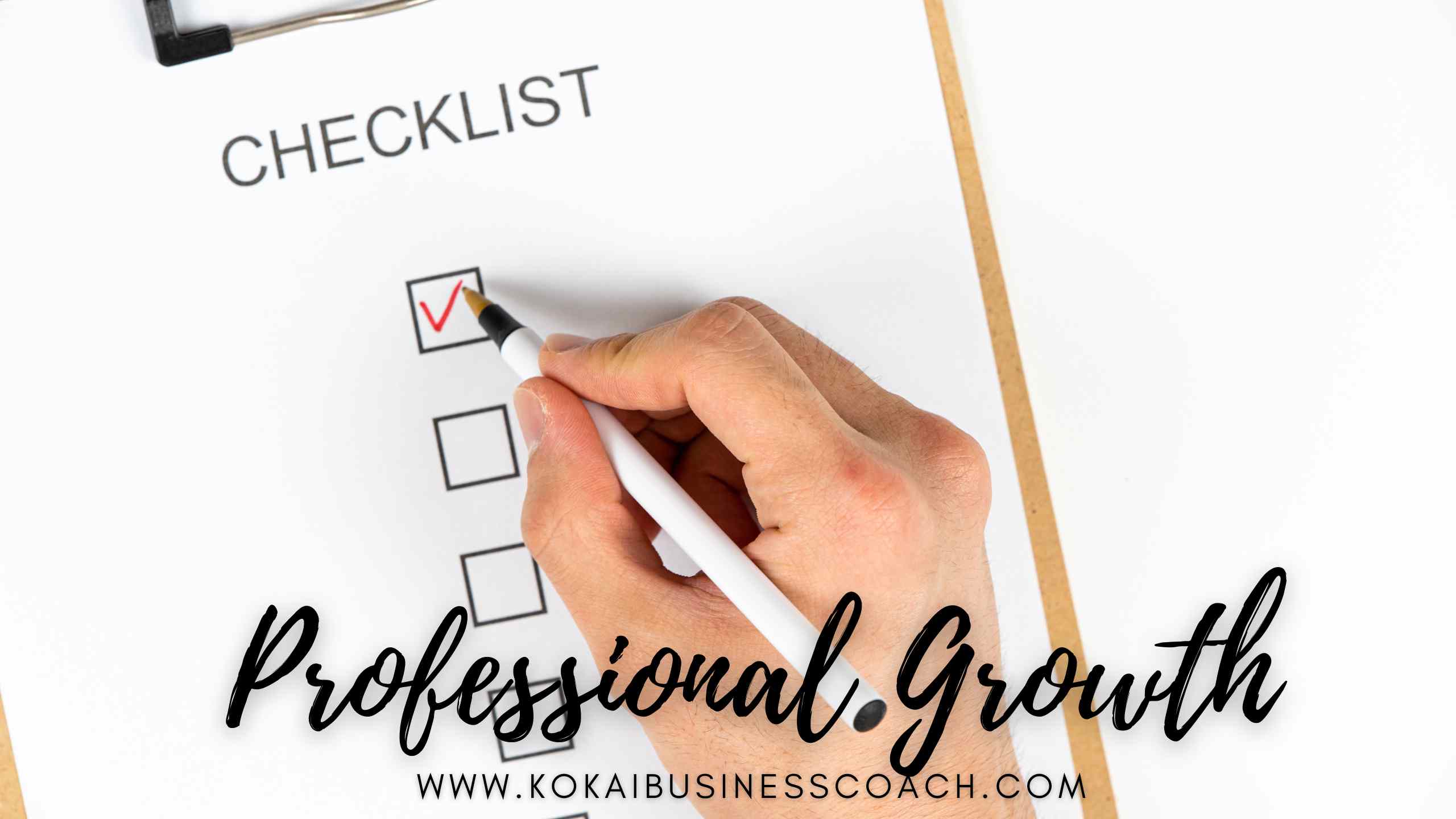Professional Growth

One of the most common business coaching topics is your own professional growth and direction. Professional growth is the application of new experiences and skills to positively impact your current position and career pursuits. By expanding your skills and thinking ahead, you are preparing yourself to handle more responsibilities. Investing in your professional growth shows ambition, self-awareness, humility and tenacity.
In my opinion you professional growth highly correlates with your corporate visibility, but in this article we’d rather focus on how you turn what you learned into results, such as more responsibilities, promotions and job changes. In other words, development refers to the actions that create growth.
The society of today demands that when you graduate from college, you already have some plan (or not) what to do with your life. Social media presents the idols of young professionals conquering the world before they are 30. Business careers seem to start much earlier in the twenties. We all know from experience, that career paths in real life are croocked as hell.
You might realize that your career path is not a straight, shiny highway and certaily you will have some bumps on the way.
As many of my schoolmates I certainly had no idea what to do after I finished school. If you have a dream job, it’s probably lightyears away from your experience, talent and network to even be called for an interview. Most probably – under the pressure of the family and friends – you start some entry level job at a corporate world and check if it fits for you.
My Story
I wanted to be a diplomat after I finished college of foreign trade.
As a fresh economist specialised for foreign trade I found myself at at IT distributor company in 1998. I know many of you hate the concept of the “career ladder”, but in the early days I literally had to spend 2 weeks at the shopfloor and the warehouse before you started to buy and sell stuff. Just to be aware of the consequences of your actions you buy and sell.

Still I did not complain and the job seemed to be fun, and as we operated as a startup, we had a lot of freedom in how we made business decisions – within some financial, legal and stock control. The management was open to new ideas – if we could “speak the figures”, they could be convinced.
Therefore my own professional development was pretty quick and I became the business unit lead in 2 years. Although I was a successful sales specialist I had no idea how to lead this small team of six. It happens very often that the person being successful as an individual gets the responsibility to lead a team when the company is growing, but we are not born with leadership skills, most of us learn it on the go – if you are not lucky to take a fasttrack of a leadership development program of the corporate.
Certainly my company was all, but a corporation at that time, so I developed my own frame of work so I started listening to the people in my team. Then soon I was carving to work for corporate. But this is another story.
Elements of Professional Growth
It starts with your motivations. What is your goal? Intrinsic motivation stems from autonomy, information and connections. Identify your motivators and learn how to optimise or increase them. Next step is your daily routines. There are only so many hours in the day and we need to find ways to optimise for our productive time. There are multiple tools and methods you can use to concentrate on what’s really important. You can be like Santa and make a list, check them twice, or you can use your favourite mobile app or your laptop. Finding ways to become more effective at your job will benefit you personally and professionally. A business coach can help you develop an action plan to find balance in all areas of your career, not just between work and home life but also between routine and creative time. Your coach can also help you think through how to manage and eliminate work-related stress and find your balance between motivating stress and toxic stress. Identify and overcome the challenges that cause or increase non-productive work-related stress.

Your Habits
Whatever happens during the business coaching sessions, there are certain actions you have to do alone without the help of your coach. I earlier wrote about the importance of shaping habits, and as a conclusion we can say routines takes hard work. Identify when you are most productive and develop a strategy for maximising your efforts. (If you are an early bird, it’s the morning, if you are a night owl, it’s rather the evening/night)
You might also have heard that there’s no real goal without a deadline. Develop your time management and focus: set boundaries, with yourself and others in order to manage your time more effectively and stay focused. It also includes managing your time and your calendar. There are tons of books on this topic, still this is only a small fraction of the full game being ‘efficient.’ By the way: what does it mean to you to be efficient?
Get Your Team Together
Another field you might want to work on is get team buy-In: determine how to identify stakeholders and gain their support. You must use empathy and improve your listening skills so you can understand the complex dynamics of your new team. You also might use external support of a team coach.
Another field is how you can become more proactive: Identify areas where you can plan ahead to prevent unnecessary obstacles, reduce future workloads and increase successful outcomes. Prioritise your workload and then delegate or eliminate what you can’t (or shouldn’t) manage. This includes careful delegation, some automation (we are in 2022 already) and in some cases dropping some (unnecessary/improductive) tasks to the dustbin and cancelling them. If you are in a constant ‘firefighter’ mode, you might evaluate incoming tasks by urgency/importance to tackle them appropriately. (Eisenhower-matrix)
Becoming a leader will result in conflicts, too. If you can’t take the heat, do not accept the promotion.
“If you want to make everyone happy, don’t be a leader, sell ice cream”. Steve Jobs.
What can truly help you to manage these interpersonal conflicts is to build communication skills and understand your biases to manage and overcome conflicts relating to projects or processes.
Improve Your Assertive Communicaton
Professional success may be influenced by how successfully you communicate with clients, coworkers and leaders. To be assertive means that we’re honest with ourselves about our own values and willing to act according to them. More specifically, assertive communication means that we’re willing and able to express our wants and feelings directly and respectfully. Being assertive can be difficult. Other people often react negatively, and we can feel afraid or uncomfortable as a result. Look for development opportunities, such as an assertive training courses, to strengthen your assertive communication as part of your professional growth. You may learn more about how to modify your discussion based on someone’s attitude and communicate in other ways, such as in person, by email or over the phone. Communication skills also entail understanding body language, how to read it, and being aware of your own.
Discuss Your Goals With A Manager
It’s important to let your manager know about your career aspirations. After all, part of their job is to foster your development and become a valuable asset for the company. If they know you’re eager to take on new challenges, they will likely start to trust you with more responsibilities.
It’s a good idea to talk to your boss periodically about your work, even if you have a formal performance evaluation process at your company. Use this time to discuss what is going well, to ask for suggestions on how you can add more value to the team, and to find out about opportunities to raise your profile. Most companies introduce development plans for the employees, and good leaders are happy to help their team members to step forward.
Your manager can also be a great resource regarding available training courses. If you’re self-employed or work independently, ask a colleague in your industry if they know of opportunities to expand your skills or experience.
Search For New Opportunities
While training is important to professional development, experience and opportunities can be just as transformative for professional growth. Look for opportunities to take on projects that challenge you and help grow your skill set. By taking on new responsibilities, you will learn more about your potential.
Pursue Leadership Development
Developing your leadership skills is an excellent way to advance your professional growth. A leadership development program can help you learn how to be an effective leader. Use this experience as a time to absorb as much information as possible. Adding this experience to your resume shows employers you’re serious about becoming an effective leader.
Remember, there will be no perfect time for making a change. The perfect time is today. If you are troubled setting your goals, I’m here to help, contact me for a free clarity call!
